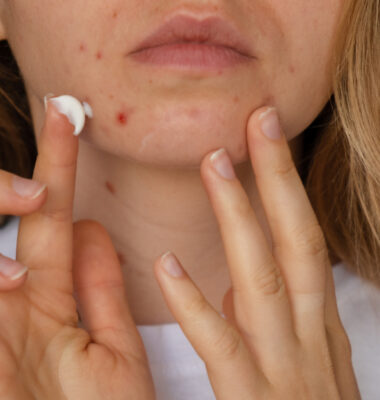Is Niacinamide Good for Your Skin? How this Ingredient Can Revolutionize Your Skincare Game
Fact checked
By Zuri Hawkins Jarret, Certified Pharmacotherapy Specialist, PharmD, MPH, BCPS
Last Updated on November 2nd, 2023 / Published on August 21, 2023

You’re not alone if you’ve struggled for years with skincare concerns such as acne, hyperpigmentation, or aging skin. In recent years, skincare enthusiasts have been raving about the numerous benefits of niacinamide, also known as vitamin B3 or nicotinamide.
This wonder ingredient has been the subject of various studies and has proven to offer remarkable benefits for the skin. Niacinamide could be the game-changer you’ve been searching for.
Let’s delve into the fascinating world of niacinamide and explore how it can revolutionize your skincare game.
Niacinamide for Skincare
Niacinamide is a naturally occurring compound and an essential nutrient. An essential nutrient is a substance your body needs to stay healthy and function properly.
Since your body can’t produce enough of these essential nutrients by itself, you must get them from food. You’ll find niacinamide in various plant and animal sources, including:
- Meats: Chicken, turkey, beef, pork, and organ meats like liver
- Fish: tuna, salmon, and sardines
- Legumes and Nuts: peanuts, lentils, and beans
- Whole Grains: wheat, barley, and rice
- Vegetables: Mushrooms, avocados, potatoes, and green leafy vegetables
Your body also synthesizes niacinamide to make sure you have enough. It does this by breaking down niacin (also known as vitamin B3), another essential vitamin found in food. Your body converts niacin into niacinamide because it needs niacinamide to help produce energy and repair DNA.
Similarly, your body converts tryptophan, another essential amino acid found in food, into niacinamide. But tryptophan is not the main source of niacinamide. You get most of your niacinamide directly from your food or supplements.
Many skin care products use synthetically produced niacinamide. It comes in various forms that let you choose the best product for your skin needs.
Choosing the form of niacinamide that aligns with your skin type and skincare goals is essential. Reputable brands contain an adequate concentration of niacinamide.
8 Niacinamide Skincare Benefits
Niacinamide continues solidifying its place as a stable ingredient in skin care. The following are some niacinamide skincare benefits:
- Enhances Skin Barrier Function: Niacinamide strengthens the skin’s natural barrier, promoting the synthesis of ceramides that retain moisture and protect against outside stressors.
- Moisturizes Skin: Niacinamide has hydrating properties that improve skin moisture levels.
- Helps Manage Oily Skin: It regulates the production of sebum (your skin’s oily secretions), making it useful for individuals with oily skin.
- Minimizes Pore Appearance: It helps tighten pores, leading to smoother-looking skin.
- Protects Against Sun Damage: Niacinamide can support your skin’s defenses against sun-induced damage and photoaging.
- Reduces Inflammation: Its anti-inflammatory properties help soothe and calm irritated or inflamed skin, making it beneficial for sensitive or acne-prone skin.
- Fades Hyperpigmentation: Niacinamide helps reduce dark spots and even out skin tone by regulating melanin production.
- Reduces Fine Lines and Wrinkles: Niacinamide’s role in preserving collagen helps to reduce the appearance of fine lines and wrinkles.
Using niacinamide leaves your skin healthy, radiant, and full of beauty and confidence.
How Niacinamide Works on the Skin
At this point, we know niacinamide helps improve your skin’s look, feel, and health. But how does it work?1-4
- Boost Cellular Energy: Niacinamide is vital for generating cellular energy, acting as a building block for coenzymes needed in energy-producing processes.
- Support DNA Repair: Niacinamide affects proteins and enzymes responsible for DNA repair, ensuring the genetic material in cells remains stable and intact.
- Preserve Collagen: Niacinamide prevents collagen breakdown, a crucial protein that keeps skin firm and elastic. This preservation promotes a more youthful appearance.
Is Niacinamide Good for Your Skin? Examining the Evidence
Scientific studies5 have demonstrated the efficacy and safety of niacinamide in improving various skin concerns without significant side effects. Here are some studies showing niacinamide is good for your skin.
Niacinamide helps treat acne
In a review of several studies,5 niacinamide-based products improved acne compared to baseline. When researchers compared niacinamide to other standard acne treatments, it performed similarly. Overall, study participants tolerated niacinamide without any major side effects.
Niacinamide helps prevent signs of aging
Niacinamide’s antioxidant properties help to prevent signs of aging caused by environmental and internal factors.
In one study,6 researchers exposed participants to oxidative stress from environmental pollutants. Oxidative stress occurs when there are too many damage-causing molecules and insufficient protective antioxidants in the body. They found niacinamide effectively shielded skin cells from the harmful effects of oxidative stress.
Another study7 found that regular application of 5% topical niacinamide reduces uneven skin tone in people aged 40-60. Participants also saw reduced wrinkling, red blotchiness, and hyperpigmented spots. Similar results were seen with niacinamide-based products compared to standard treatments.5
While experts generally like niacinamide, everyone’s skin is different, so the results can vary from person to person. To find the right niacinamide product for you, you should talk to a dermatologist. They can give you personalized advice and help you pick the best niacinamide product that suits your skin’s needs.
Incorporating Niacinamide into Your Skincare Routine
Finding the Right Niacinamide Skincare Products
Choosing the right niacinamide skincare product can be tricky due to the variety available.
To make the best choice, consider these factors:
- Niacinamide Concentration: Check the percentage of niacinamide; higher concentrations (2%-5%)8 may work better for specific skin concerns.
- Skin Type: Select a lightweight serum for oily or acne-prone skin or cream for dry skin.
- Complementary Ingredients: Look for products with hyaluronic acid, vitamin C, or peptides to enhance niacinamide’s effects.
- Potential Irritants: Avoid products with irritants or allergens, especially if you have sensitive skin.
- Reviews and Reputation: Read reviews from trusted sources to gauge product effectiveness.
Perform a patch test before using any new product. Also, since your skin may have specific needs, consult your dermatologist first for personalized advice.
Complementing Niacinamide with Other Skincare Ingredients
To create a comprehensive skincare routine, combine niacinamide with other beneficial ingredients.
Hyaluronic acid and niacinamide
Teaming niacinamide with hyaluronic acid boosts hydration as it locks in moisture.
Vitamin C and niacinamide
Vitamin C, as an antioxidant, strengthens your skin’s defense against damage, giving it a brighter complexion and reducing fine lines.
Exfoliants and niacinamide
Using niacinamide with gentle exfoliants like AHAs or BHAs can improve your skin texture.
When to Use Niacinamide in Your Skincare Routine
Daytime and Nighttime Applications
Niacinamide offers multiple benefits for both daytime and nighttime use. During the day, apply it after cleansing and toning but before moisturizing and sunscreen. This order shields the skin from environmental stressors and improves oily skin.
At night, include it in your routine after cleansing, toning, and using other active ingredients like retinoids. The frequency of use depends on the concentration and your skin’s tolerance, with once or twice daily being sufficient for most. Follow the product’s instructions and start with a lower frequency if you’re new to niacinamide.
Combining Niacinamide with Sunscreen and Other Products
Combining niacinamide with other skincare products can create a powerful routine for healthy skin.
Here are some tips for using niacinamide with other products:
- Niacinamide and Sunscreen: Apply niacinamide first for added protection against damage, and then use sunscreen to shield from harmful UV rays.
- Niacinamide and Vitamin C: These antioxidants work well together. Use vitamin C in the morning and niacinamide in the evening to avoid issues.
- Niacinamide and Retinoids: Niacinamide can reduce irritation from retinoids. Use niacinamide in the morning and retinoids at night.
- Niacinamide and Hyaluronic Acid: Apply niacinamide first, followed by hyaluronic acid, to lock in moisture.
By understanding how to combine niacinamide with other products, you can get the most out of its benefits and effectively improve your skin’s health.
Potential Side Effects and Precautions
While niacinamide has many benefits for the skin, it’s important to be aware of potential side effects.
Allergic reactions, though rare, can cause redness, itchiness, or mild burning. To avoid issues, do a patch test first, especially if you have sensitive skin.
While niacinamide usually works well with other skincare ingredients, be cautious when using it with certain products like acids or retinoids, as it may lead to skin discoloration.
If you’re considering adding niacinamide to your routine, consult your dermatologist or doctor, especially if you have specific skin concerns.
Niacinamide Cream for Face: A Deep Dive
Exploring Niacinamide Cream Formulations: Creams, Serums, and Lotions: Which is Best?
So, which formulation of niacinamide is best? With so many on the market, how do you choose what works for your skin type? Some standard options include:
Niacinamide Creams: Creams are thicker and provide a moisturizing effect locking in moisture. Creams are suitable for those with dry or normal skin types.

Niacinamide Serums: Serums have a lightweight and fast-absorbing texture allowing for a more potent concentration of niacinamide without the added weight of a cream. Serums are beneficial for all skin types, including oily and combination skin.

Niacinamide Lotions: Lotions are lighter than creams but thicker than serums. They offer a balanced level of hydration and work for various skin types.

Niacinamide Toners: Toners are watery solutions usually applied with a cotton pad or spritzed onto the skin. They’re suitable for adding niacinamide into your routine without using heavier products.

Niacinamide Face Masks: Some face masks contain niacinamide as a key ingredient to provide a concentrated boost of nutrients to the skin. For an extra skincare treat, use these masks occasionally.

Niacinamide Cream DIY Recipes and Tips
If you like making your skincare products, you can try DIY niacinamide recipes with the proper precautions.
Use high-quality niacinamide from trusted suppliers and keep the concentration at 2-5% to avoid irritation.
Be careful with other strong ingredients like acids or retinoids. Make sure to keep everything clean and sterilized when making and storing your DIY cream. Keep it in a dark, airtight container to protect its potency.
Remember DIY skincare has some risks, and not all homemade products may work well. If you want a more reliable option, consider using commercial skincare products with niacinamide from reputable brands backed by research.
Takeaway
Niacinamide is a powerful skincare ingredient with various benefits, like strengthening the skin’s barrier and reducing inflammation.
Niacinamide works well for different skin types. However, individual reactions can vary, so it’s crucial to consult a dermatologist or doctor before using niacinamide in your routine. They can provide personalized advice and ensure it’s safe for you. With their guidance, you can enjoy the full potential of niacinamide, achieving healthy and radiant skin.
REFERENCES
- Snaidr VA, Damian DL, Halliday GM. Nicotinamide for photoprotection and skin cancer chemoprevention: A review of efficacy and safety. Exp Dermatol. 2019 Feb;28 Suppl 1:15-22.
- Park J, Halliday GM, Surjana D, et al. Nicotinamide prevents ultraviolet radiationinduced cellular energy loss. Photochem Photobiol. 2010 Jul-Aug;86(4):942-8.
- Fania L, Mazzanti C, Campione E, Candi E, Abeni D, Dellambra E. Role of Nicotinamide in Genomic Stability and Skin Cancer Chemoprevention. Int J Mol Sci. 2019;20(23):5946. Published 2019 Nov 26. doi:10.3390/ijms20235946
- Boo YC. Mechanistic Basis and Clinical Evidence for the Applications of Nicotinamide (Niacinamide) to Control Skin Aging and Pigmentation. Antioxidants. 2021; 10(8):1315. https://doi.org/10.3390/antiox10081315
- Kalasho BD, Minokadeh A, Zhang-Nunes S, et al. Evaluating the Safety and Efficacy of a Topical Formulation Containing Epidermal Growth Factor, Tranexamic Acid, Vitamin C, Arbutin, Niacinamide and Other Ingredients as Hydroquinone 4% Alternatives to Improve Hyperpigmentation: A Prospective, Randomized, Controlled Split Face Study. J Cosmet Sci. 2020;71(5):263-290.
- Zhen AX, Piao MJ, Kang KA, et al. Niacinamide Protects Skin Cells from Oxidative Stress Induced by Particulate Matter. Biomol Ther (Seoul). 2019;27(6):562-569. doi:10.4062/biomolther.2019.061
- Bissett DL, Miyamoto K, Sun P, Li J, Berge CA. Topical niacinamide reduces yellowing, wrinkling, red blotchiness, and hyperpigmented spots in aging facial skin. Int J Cosmet Sci. 2004;26(5):231-238. doi:10.1111/j.1467-2494.2004.00228.x
- Voegeli R, Guneri D, Cherel M, Summers B, Lane ME, Rawlings AV. Topical niacinamide enhances hydrophobicity and resilience of corneocyte envelopes on different facial locations. Int J Cosmet Sci. 2020;42(6):632-636. doi:10.1111/ics.12666






